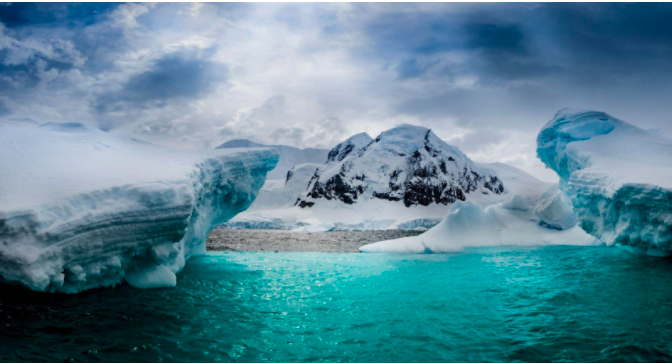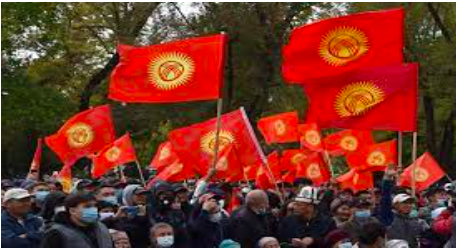Major Power competitions in the Arctic region- The “next great game”?
Posted on : July 5, 2021Author : Ankita Chatterjee

The Arctic, with its scenic and picturesque natural beauty, lush green valleys and ice-capped mountains, glaciers and its ocean, has always encaptivated people. However, as the Arctic grows warmer, even this comparatively peaceful region is not completely free from tug-of-war among the major powers such as the United States, China, and Russia. Few places have been the source of as much speculation, hype, and broad statements as the Arctic region at the start of the 21st century. Some researchers and journalists are calling the Arctic the focal point of “the next great game”. Melting ice caps are allowing for the extraction of the rich natural resources of the area, as well as opening sea routes for commercial purposes. Consequently, the Arctic region has gained significant strategic value and this could become even more important in the coming years with the global order gradually inclining towards a multipolar system. The issues of sustainable development and environmental protection in the Arctic region are managed by an intergovernmental forum, the Arctic Council. It has been opined that the power holding the Arctic could gain a crucial advantage over its rivals and that has prompted a race for the North Pole. While a historic Arctic power like Russia is militarizing its waters, the near-Arctic China is extending its commercial reach to Greenland and Russia with the Polar Silk Road component of its Belt and Road Initiative (BRI). The United States looks upon both as competitors in a renewed geopolitical competition for power and influence in the High North.
RUSSIA
With around 53% of its coastline in the Arctic, Russia is a major Arctic power. For Russia, the Arctic is a place of high stakes. Much of the untapped oil and gas resources in Russia’s territorial boundaries lies in the Arctic, leading the region to be extraordinarily economically important to the country. As the ice cover in the Arctic decreases, Russia hopes to gain economic influence and make use of the Northern Sea Route shipping channel to export oil and gas to overseas markets. Over the past few years, Russia has been steadily increasing its military and commercial presence in the Arctic, developing new bases as well as renovating the old ones. Further, Russia is also constructing new icebreakers and submarines, some of which are nuclear powered, making it the country possessing distinct advantage in terms of actual military equipment. In 2014, Russia established a new Strategic Command center for the Arctic both to increase Arctic security as well as to defend its interests. Russia’s Arctic focus is certainly notable and will play an important role as the ice continues to melt, and resources become easier to access.
CHINA
China has now emerged as the near-Arctic newcomer and has steadily been increasing its footprint in the Arctic since the last decade. Joining the Arctic Council as an observer in 2013 and releasing its first white paper on Arctic Strategy in 2018, China presented the Polar Silk Road component of its Belt and Road Initiative (BRI). Beyond that, China sees the development of oil, gas, fishing, and tourism as key industries to become involved in the Arctic as global warming progresses. Although China’s interest appears to be economic and commercial, Mike Pompeo, the former US Secretary of State , called China a threat to Arctic peace and that Beijing’s Arctic activity risked creating a “new South China sea ”.
Another flashpoint between the US and China is Greenland. Recently, China attempted to buy an older naval base and build a new airport in Greenland but the effort was halted by the US government, claiming they would invest in these projects instead of China. However, China is still moving forward to build investment relationships with Greenland, Iceland, and Finland concerning geothermal energy and reinforcing the Polar silk road. However, most importantly, China is not accepted as an Arctic state and has largely been excluded from regional politics. Besides, it can also be said that the USA sees the Arctic as another arena where the emerging systemic competition between the two countries is increasing.
It has been observed that Russia and China are increasingly working together on Arctic development, where China has been providing funding for Russian infrastructure and energy projects in the Arctic. However, it remains to be seen whether these two powers, who do not have a historically close relationship as such, will continue to work together in the Arctic.

USA
The American approach to the Arctic is to see the region as the next theatre in great power competition by slowly increasing its presence militarily and economically. With the advent of the Biden administration, the US has shown a growing interest in the region. The US recently commissioned the construction of two new icebreakers, which are scheduled to be delivered by 2024, as compared to the 54 icebreakers that Russia has, some of which are nuclear-powered. Moreover, both the US Navy and the US Department of Homeland Security released new Arctic strategies illustrating the country’s renewed Arctic focus. However, besides the absence of an adequate number of icebreakers, the US capability and capacity lags behind regional requirements such as the lack of a strategic Arctic port, degradation or loss of communications at high latitudes and scarce polar-capable Navy and Coast Guard surface ships.
It is observable that while the US is not nearly as aggressive as Russia, the American rhetoric is becoming more pointed at keeping Chinese influence low and containing the Russian militarization in the Arctic region. The US and NATO forces are conducting manoeuvres in the Arctic with increasing regularity lately, which is becoming a major irritant for Russia.
SCANDINAVIA
The five Nordic states – Norway, Sweden, Denmark, Finland and Iceland – are directly involved in Arctic strategy because of their location near the Arctic Circle. As a result, they sit with the major powers on Arctic issues. One factor affecting the five countries’ approaches to the Arctic is their differing membership of international organisations. On the one hand, Denmark, Iceland and Norway are members of NATO. On the other hand, Finland, Sweden, and Denmark are part of the European Union. However, with the creation of the Nordic Council in 1952 and the military organisation NORDEFCO in 2009, all five countries cooperate and adopt a common strategy on Arctic policy.
INDIA
Given its increasing economic power and energy needs, India too is interested in opportunities in the Arctic. India has, thus, been shifting its focus toward the economic, political, and strategic dimensions of the Arctic in a way where it can engage constructively with the Arctic littorals to protect its growing energy, scientific, and economic interests. Though India is not strategically located in the region, it has been given the observer status in the forum of Arctic Council. Besides, India has formed cordial partnerships with Russia, Norway and Sweden for resources exploration and scientific cooperation. However, India’s current capabilities and its geographical distance do not allow it to comprehensively secure its interests in the Arctic amid emerging great power competition that is igniting instability in the region. In the near future, India may look to develop more security partnerships in the region for access to ports and bases to enhance its presence in the long term.
On May 20, 2021 at the meeting of Arctic Council Foreign Ministers in Reykjavik, Iceland, the US Secretary of State Antony Blinken said the group should maintain its focus on peaceful cooperation on environmental issues, maritime safety and the well-being of indigenous people in the region. Also, Mr. Blinken stressed the importance of upholding “effective governance and the rule of law” to ensure that the “Arctic remains a region free of conflict where countries act responsibly.” The other Foreign Ministers from Canada, Iceland, Finland, Norway and Sweden, also echoed Mr. Blinken’s call to keep the Arctic peaceful and free of conflict.
With the new Biden administration, it will be quite enthralling to watch the rise and fall of American temperature and pressure in the Arctic and how the other powers counteract. In fact, the main point is that however many times the Arctic is hailed as a region of international cooperation, the region is growingly seen as the new theater for geopolitical competition between Russia, China, and the US and its NATO allies.
References
- Andreas Osthagen, “The Nuances of Geopolitics in the Arctic”, The Arctic Institute, January 7, 2020
https://www.thearcticinstitute.org/nuances-geopolitics-arctic/
2. Julien Dalman, Alexandre Delepierre, Camille De Sutter, Gaultier Fort and Alberto Rizzi, “Great Power Competition in the Arctic”, Finabel European Army Interoperability Centre, August 31, 2020
https://finabel.org/wp-content/uploads/2020/08/Finabel-FFT-Great-Power-Competition-in-the-Arctic.pdf
3.Bradley Bowman and Maj. Scott Adamson, “Great power competition heats up in the thawing Arctic, and the US must respond”, Defense News, September 23, 2020
4. “Russia asserts presence in Arctic with northern military base”, The Economic Times, May 19, 2021
5.“U.S., Russia at odds over military activity in the Arctic”, The Hindu, May 20, 2021
6.Shishir Rao, “What Can India Bring to the Table as Great Power Competition Heats Up the Arctic?”, The Diplomat, September 14, 2020
Ankita Chatterjee
Intern, Asia in Global Affairs




